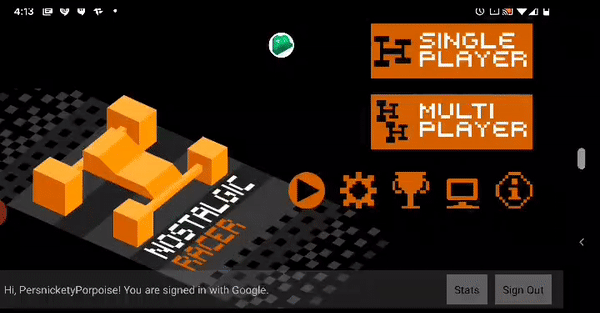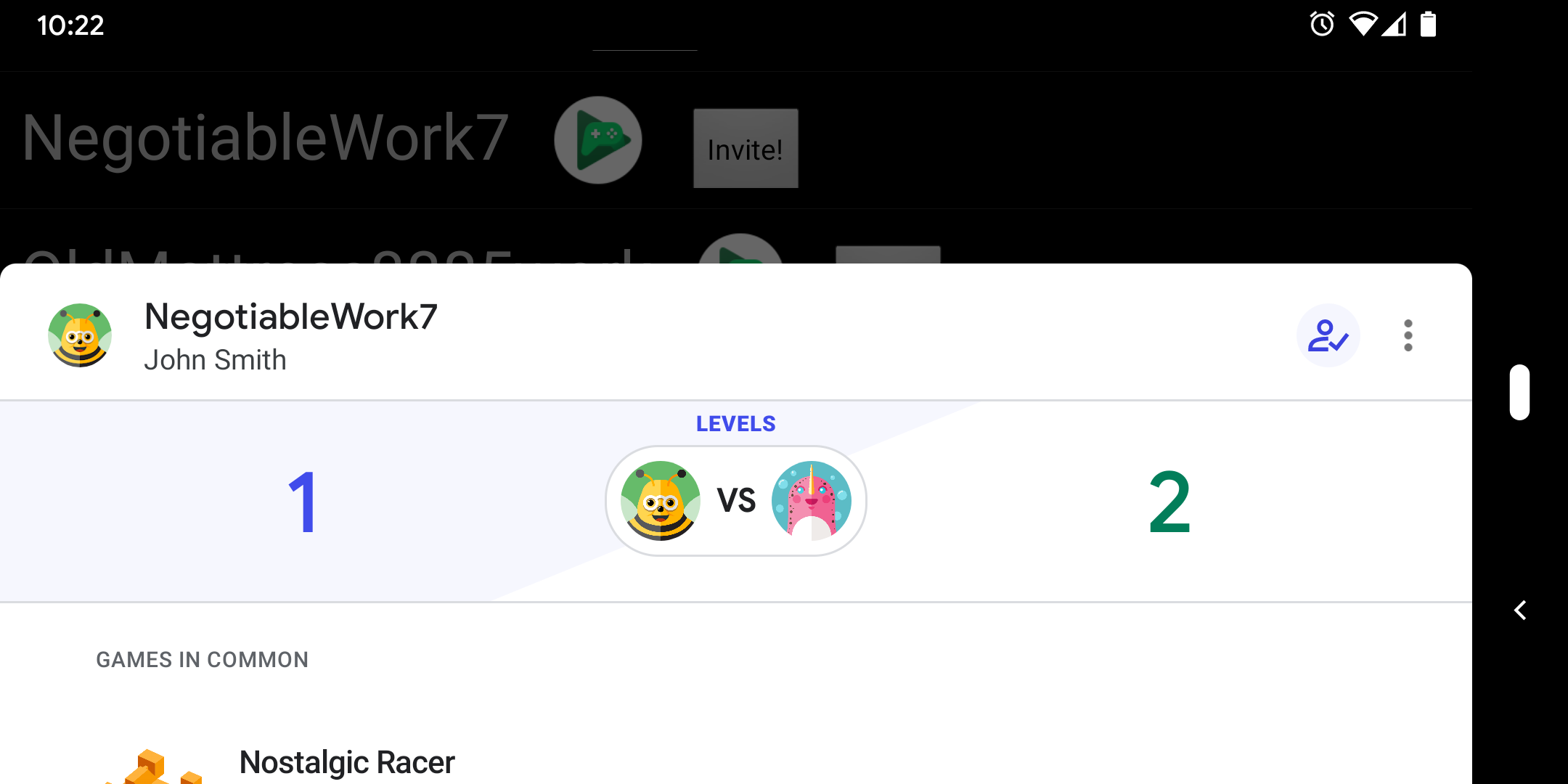از APIهای دوستان برای تکمیل و بهبود سیستم دوستان درون بازی موجود و سایر سیستمهای اجتماعی که بازی شما ممکن است به آنها دسترسی داشته باشد، استفاده کنید. این به شما امکان میدهد بازیکنان را قادر سازید تا:
دوستانشان را در بازی خود پیدا کنید.
امتیازات خود را با دوستانشان در جدول امتیازات مقایسه کنند.
فهرست دوستانشان در بازیهای Play را با فهرست دوستان موجود در بازی ترکیب کنید.
با استفاده از یک پنجرهی پروفایل درون بازی، بازیکن دیگری را شناسایی کنید. این پنجره، لقبی را که بازیکن فعلی به دوست خود داده است، نشان میدهد تا بداند با چه کسی بازی میکند.

مبانی
این APIها به شما امکان میدهند اقدامات زیر را انجام دهید:
- بارگذاری دوستان : میتوانید بررسی کنید که آیا بازیکن به بازی اجازه دسترسی به اطلاعات لیست دوستان را داده است یا خیر. در صورت اعطای دسترسی، میتوانید لیستی از اشیاء بازیکن مربوط به دوستان بازیکن احراز هویت شده را دریافت کنید.
- نمایش نمایه بازیهای پلی بازیکن دیگر : میتوانید این نما را باز کنید تا نامی که توسط بازیکن احراز هویت شده به بازیکن دیگر داده شده است را مشاهده کنید. این نما همچنین کنترلهای مدیریت دوستی را ارائه میدهد و بازیکن را از بازی شما خارج نمیکند.
- ارائه کنترلهای کاربر : کاربر کنترلهایی برای مدیریت نحوه نمایش پروفایل بازیهای Play خود برای دوستان و نحوه نمایش لیست دوستان خود برای بازیها دارد. برای دسترسی به لیست دوستان، کاربر میتواند انتخاب کند که به طور خودکار به همه بازیها دسترسی داده شود یا میتواند دسترسی هر بازی را به صورت جداگانه تأیید کند. در نتیجه، هنگام بارگذاری لیست دوستان، نتیجه ممکن است یک فراخوانی برای نمایش درخواست دسترسی باشد.
وارد کردن فهرست دوستان بازیهای Play
شما میتوانید از APIهای دوستان برای دریافت فهرست دوستان بازیهای پلی بازیکنان خود استفاده کنید و آنها را به فهرست دوستان درون بازی خود اضافه کنید.
کاربران جدید یک لیست اولیه از دوستان خود برای بازی خواهند داشت و کاربران فعلی میتوانند دوستان خود در Play Games را به هر لیست دوستان درون بازی وارد کنند. در نتیجه، کاربران شما بزرگترین مجموعه ممکن از بازیکنان را برای بازی یا رقابت در اختیار خواهند داشت.
دوستان Play Games را به بازی خود اضافه کنید
با مرتبط کردن شناسه بازیهای Play آنها با اطلاعات بازیکن مربوطه در پایگاه داده داخلی خود، دوستان Play Games خود را به هر لیست دوستان موجود در بازی اضافه کنید. مطمئن شوید که دکمهای با نماد بازیهای Play در کنار این دوستان دارید که با فشردن آن، نمایه بازیکن دیگر نشان داده میشود تا کاربران شما بتوانند دوستان را بشناسند.
هنگام استفاده از لیست دوستان از یک سرور backend، آن را به طور ایمن با استفاده از REST API بارگذاری کنید ، نه اینکه نتیجه API اندروید را ارسال کنید. مطمئن شوید که از شناسه بازیکن برگردانده شده توسط players.get(me) در REST API برای بازیکنی که در حال حاضر احراز هویت شده است، استفاده میکنید، زیرا این با شناسهای که توسط سایر بازیکنان دیده میشود، سازگار خواهد بود.
اگر فهرست دوستان افزودهشده ذخیره نشود (و فقط در زمان مشاهده استفاده شود)، نیازی به کار اضافی نیست.
دسترسی به بازیهای Play را اعطا کنید
اگر بازی شما از قبل به Play Games دسترسی ندارد، زمان مناسبی برای درخواست رضایت از کاربران زمانی است که آنها لیست دوستان درون بازی شما را مشاهده میکنند. برای مثال، میتوانید دکمهای به نام Import Play Games friends اضافه کنید که با لمس آن، کاربر رضایت خود را اعلام میکند. (حتماً از لوگوی Play Games روی هر دکمهای که به این سرویس اشاره میکند، استفاده کنید.)
مشاهده پروفایل بازیکن دیگر
شما میتوانید به بازیکن احراز هویت شده خود اجازه دهید تا پروفایل بازیهای پلی بازیکن دیگر را مشاهده کند. این به بازیکن احراز هویت شده اجازه میدهد نامی را که به بازیکن دیگر داده است و اینکه آیا آنها از قبل دوست هستند یا خیر، ببیند و اطلاعات بیشتری در مورد رابطه به او بدهد. اگر بازیکنان هنوز دوست نیستند، بازیکن احراز هویت شده کنترلهای مدیریت دوستی را در نمای پروفایل مشاهده خواهد کرد. وقتی دوستیها از داخل بازی ایجاد میشوند، نامهای پیشفرض برای دو بازیکن، نامهای درون بازی آنها (در صورت وجود) است. نام بازیای که دوستی در آن آغاز شده است نیز نشان داده میشود.

جدول امتیازات شبکههای اجتماعی
APIهای دوستان همچنین میتوانند برای جدول امتیازات استفاده شوند. از این ویژگی برای نمایش رتبهبندی بازیکن فعلی در بین دوستان بازیهای Play خود استفاده کنید. توجه داشته باشید که این فقط برای کاربرانی که تصمیم گرفتهاند این اطلاعات را با برنامه شما به اشتراک بگذارند و اگر کاربران در بازیهای Play دوست باشند، اعمال میشود. برای پشتیبانی از این ویژگی، بازی یک کنترل را در اختیار کاربر قرار میدهد. این کنترل از آرگومان collection برای انتخاب نمای اجتماعی جدول امتیازات استفاده میکند. برای کسب اطلاعات بیشتر، به بخش مربوط به جدول امتیازات عمومی و اجتماعی مراجعه کنید.
اگر مجموعه جداول امتیازات اجتماعی را پیادهسازی کنید، فراخوانی برای بارگذاری امتیازات جدول امتیازات ممکن است یک خطای عدم قطعیت مبتنی بر رضایت مشابه خطای loadFriends() را برگرداند. اگر رابط کاربری پیشفرض ارائه شده توسط Play Games (مثلاً getLeaderboardIntent() ) را پیادهسازی کنید، این مورد به طور خودکار برای شما مدیریت میشود.
مراحل بعدی
قبل از شروع استفاده از API های Friends، موارد زیر را انجام دهید:
- نمونه کد را دانلود و بررسی کنید:
- جاوا
- برنامه نمونه یونیتی با استفاده از افزونه یونیتی
- با توصیههای شرح داده شده در چک لیست کیفیت آشنا شوید.
- API های Friends را در یک کلاینت جاوا پیاده سازی کنید.

